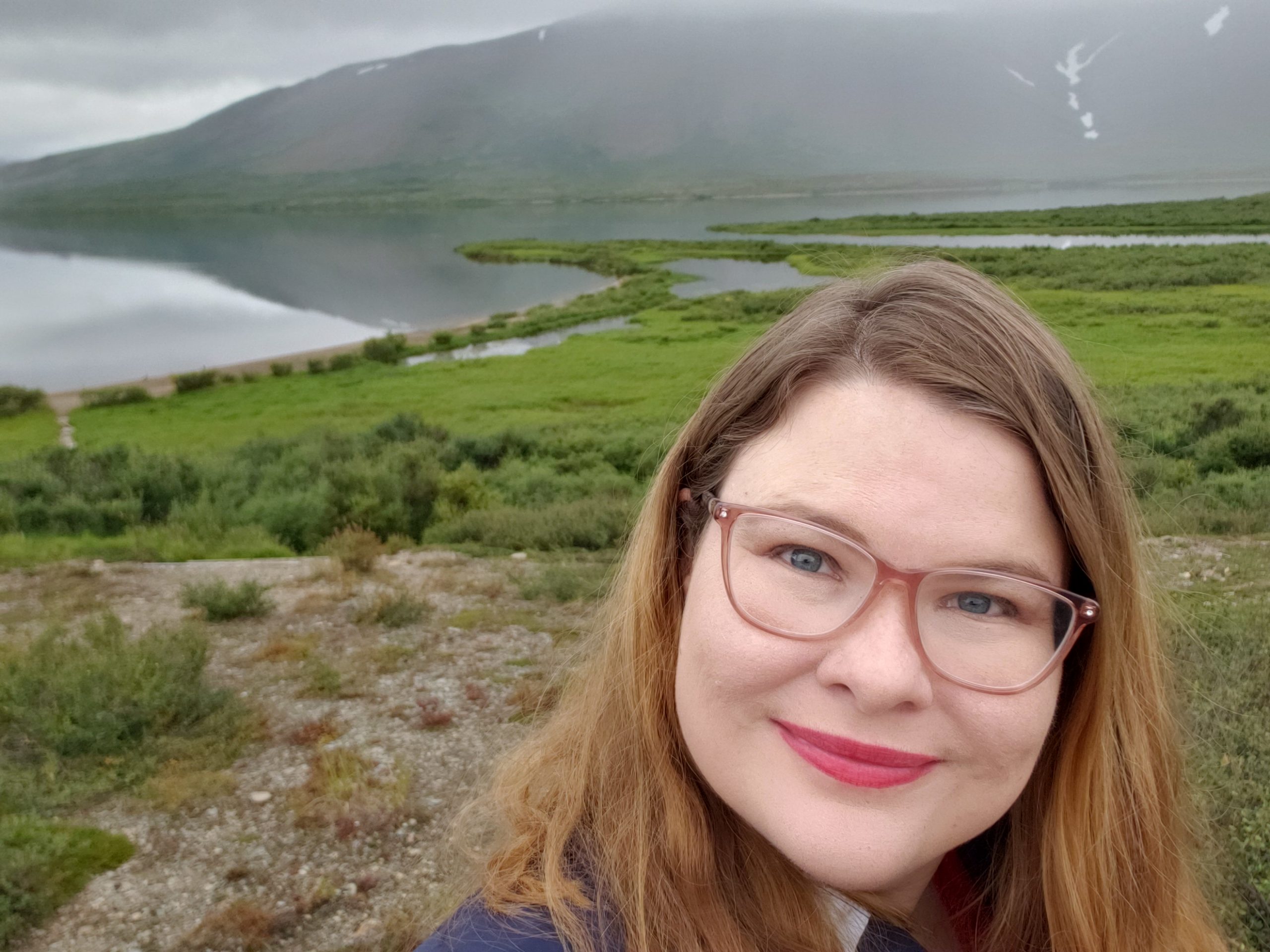CW: song contains strong language
At 15, I was having a real doozy of a time learning to express my unique and authentic self: I was a bicurious young Lutheran navigating the cliques of straight-laced, almost exclusively white youth in the aggressively heteronormative Mennonite high school I attended. You couldn’t wear tank tops or short skirts, and you were not permitted to dance. Questioning the teachings of the Church or of Scripture was out, as was cursing or considering sex before marriage.
It was suffocating.
In these walls, which brought me spiritual darkness, a few works of art and passages of the Bible hammered through the barriers to let some light in. One of these artworks was a pop song that came through these walls like a battering ram: Meredith Brooks’ Bitch.
I’m a bitch, I’m a lover
I’m a child, I’m a mother
I’m a sinner, I’m a saint
I do not feel ashamed
I’m your hell, I’m your dream
I’m nothing in between
You know you wouldn’t want it any other way
On the surface, it was wonderful to loudly sing a curse word–I didn’t get to hear many provocative expletives at that time–but then I also realized how liberating it was to own the idea that I could sometimes be rebellious, even mutinous, toward the status quo and still be a sinner-saint child of God. (By the way, I’m convinced that if Martin Luther had been around in 1997, he’d have loved this song). I could question God like the psalmists did, and I could stand apart from some Mennonite customs and not be an awful person or an anti-Christian.
I’m 39 now, and I recently remembered Bitch and have been regularly rocking out to it. It reminds me that God didn’t make a mistake when I was created: I am an adventurous, boat-rocking queer minister who loves to not only pray and worship but also to examine, question, and disobey when called to do so. And I hope God wouldn’t have it any other way.
 Bio: Melissa May (she/her) is a pastor who served for five years in the wilds of northern Canada and western Alaska, and is now taking some time away to rest and work part-time as she interviews for possible new congregational calls. She lives with family and her very well-traveled cat, Mia, in the Shenandoah Valley of Virginia, where she’s looking forward to in-person Trivia Nights and Dungeons and Dragons sessions eventually resuming.
Bio: Melissa May (she/her) is a pastor who served for five years in the wilds of northern Canada and western Alaska, and is now taking some time away to rest and work part-time as she interviews for possible new congregational calls. She lives with family and her very well-traveled cat, Mia, in the Shenandoah Valley of Virginia, where she’s looking forward to in-person Trivia Nights and Dungeons and Dragons sessions eventually resuming.

 Lewis Eggleston (he/him)
Lewis Eggleston (he/him) 
 Andrew Tobias Nelson (he/they) is a transmasculine, bi-vocational, spiritually curious minister living in Upstate NY with over 100 houseplants and their fiance, who is a druid in the local pagan community and a really good cook. Always on the lookout for sci-fi and fantasy novels by more diverse authors, trying to stay socially aware without getting overwhelmed. When it’s not covid times, Andrew sings with the Albany Gay Men’s Chorus and seeks out new trails for running in the capital district.
Andrew Tobias Nelson (he/they) is a transmasculine, bi-vocational, spiritually curious minister living in Upstate NY with over 100 houseplants and their fiance, who is a druid in the local pagan community and a really good cook. Always on the lookout for sci-fi and fantasy novels by more diverse authors, trying to stay socially aware without getting overwhelmed. When it’s not covid times, Andrew sings with the Albany Gay Men’s Chorus and seeks out new trails for running in the capital district.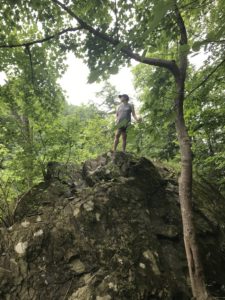 Since a young age, I struggled with the gendered expectations placed on me – girly, delicate, demure. Even now, the femininity expected of me feels like a pair of pants three sizes too small. Perhaps this is why I have always struggled with disordered eating – I have always strived for something not quite right for my body. At every turn, whether it was because my body did not fit the androgynous cut of clothing I wanted, or because peace with my body at any size has proven elusive, my body has felt less like home and more like exile. And I know I’m not alone – queer people suffer from disordered eating at higher rates than our straight peers.
Since a young age, I struggled with the gendered expectations placed on me – girly, delicate, demure. Even now, the femininity expected of me feels like a pair of pants three sizes too small. Perhaps this is why I have always struggled with disordered eating – I have always strived for something not quite right for my body. At every turn, whether it was because my body did not fit the androgynous cut of clothing I wanted, or because peace with my body at any size has proven elusive, my body has felt less like home and more like exile. And I know I’m not alone – queer people suffer from disordered eating at higher rates than our straight peers. Robin Lovett-Owen (she/her) is the intern at St. Paul’s Lutheran Church in Waukegan, Illinois and is eagerly awaiting first call. She is also an artist who makes queer Christian art, and her work can be found on Facebook, Instagram, and Etsy @3Solas. If she’s not in the studio or at church, she can be found hiking with her spouse, Lee, and dog, Sophie.
Robin Lovett-Owen (she/her) is the intern at St. Paul’s Lutheran Church in Waukegan, Illinois and is eagerly awaiting first call. She is also an artist who makes queer Christian art, and her work can be found on Facebook, Instagram, and Etsy @3Solas. If she’s not in the studio or at church, she can be found hiking with her spouse, Lee, and dog, Sophie.



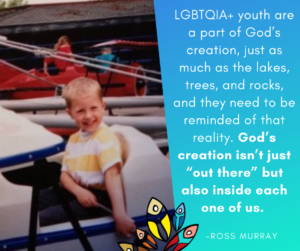

 Queer theology is to me this wonderful irrationality, the dramatic paradox of a God who comes to us as a human—and who lives and dies with us, and then lives again. A human who delights breaking the rules other humans had made to hang on to control, can set us free from the things we fear the most. We, who have been told so many times and so many ways that we are not as God intended, and yet know the deeper truth that we are indeed precisely who God made us to be, and for whom Jesus lived and died and rose again—we know what it means to have a Savior who “queers” everything—even death and life. And we can wear the loudest plaid we want, and wear the frilliest and sparkliest hat, and shout for joy to the God who loves us so extravagantly, wildly—and queerly!
Queer theology is to me this wonderful irrationality, the dramatic paradox of a God who comes to us as a human—and who lives and dies with us, and then lives again. A human who delights breaking the rules other humans had made to hang on to control, can set us free from the things we fear the most. We, who have been told so many times and so many ways that we are not as God intended, and yet know the deeper truth that we are indeed precisely who God made us to be, and for whom Jesus lived and died and rose again—we know what it means to have a Savior who “queers” everything—even death and life. And we can wear the loudest plaid we want, and wear the frilliest and sparkliest hat, and shout for joy to the God who loves us so extravagantly, wildly—and queerly! Guy Erwin (he/him) is the president of United Lutheran Seminary in Pennsylvania, and in 2013 was elected as the first out gay bishop in the ELCA and the first gay male bishop in any Lutheran church. He dresses very soberly, but loves bright vestments, his husband, his parrot, and Easter.
Guy Erwin (he/him) is the president of United Lutheran Seminary in Pennsylvania, and in 2013 was elected as the first out gay bishop in the ELCA and the first gay male bishop in any Lutheran church. He dresses very soberly, but loves bright vestments, his husband, his parrot, and Easter.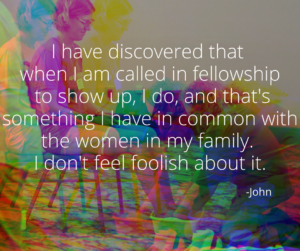
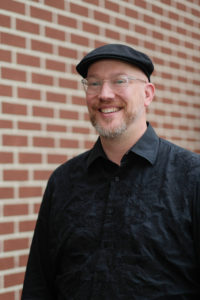
 The Rev. Laura Kuntz (she/her/hers) is serving as interim pastor and lives in Cleveland, Ohio with her wife and two dogs. Something that brings her joy is being a part of the Buy Nothing Project in her neighborhood, where people give to their neighbors out of their abundance. Her favorite items she has received were a small Ikea greenhouse and a box of old trophies she used to make a hat hanger for a friend. She loves to give away plants and anything that someone has a need for.
The Rev. Laura Kuntz (she/her/hers) is serving as interim pastor and lives in Cleveland, Ohio with her wife and two dogs. Something that brings her joy is being a part of the Buy Nothing Project in her neighborhood, where people give to their neighbors out of their abundance. Her favorite items she has received were a small Ikea greenhouse and a box of old trophies she used to make a hat hanger for a friend. She loves to give away plants and anything that someone has a need for.